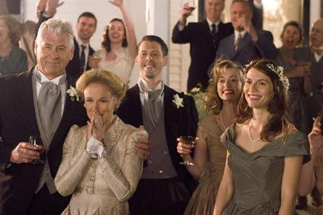|
|
Review: EveningBy Tom HousemanJuly 9, 2007
Fortunately, Koltai is able to do one thing right as the director, and it is clear that his experience as a director of photography is a benefit; the cinematography in Evening is breathtaking. Several shots look like works of art, especially the landscapes of the beach and the mansion where the wedding takes place. Watching these gorgeous views that feel like paintings is often enough to let the audience ignore the overly complicated and uninvolved storytelling, but not for the full two hours of the film. It is the cast that is the true saving point of Evening, because while the story never draws in the viewer, the characters do, mostly thanks to the excellent portrayals. Claire Danes is given her most interesting part since the TV show "My So-Called Life," and takes advantage of it by giving an emotionally restrained yet powerful performance. As the old Ann, Vanessa Redgrave takes a part that could have been extremely dull and makes it ring far more true than anything going on around her. Watching her fight death and remember the tragic events of her past is heartbreaking. But the real breakout star of the film is Hugh Dancy, who is given his first great part after films like Basic Instinct 2 and King Arthur. Buddy is filled with so many conflicting emotions throughout the film, and Dancy does a fantastic job of keeping everything just below the surface, but still letting us see the torment he is going through. His scenes with Claire Danes are the best part of the film. There are a few powerful moments in Evening that, along with the performances and the cinematography, make it a film worth seeing. But it is so frustrating seeing these glimpses of beauty trapped in the disorganized, overstuffed mess that is Evening. Had Koltai been able to produce some sort of consistency in his film, Evening could have achieved some of the potential it showed, but the film is too sloppy to overcome its myriad faults, and merely wallows instead of glides, and clomps along instead of flowing.
|

|
|
|

|
Thursday, October 31, 2024
© 2024 Box Office Prophets, a division of One Of Us, Inc.


